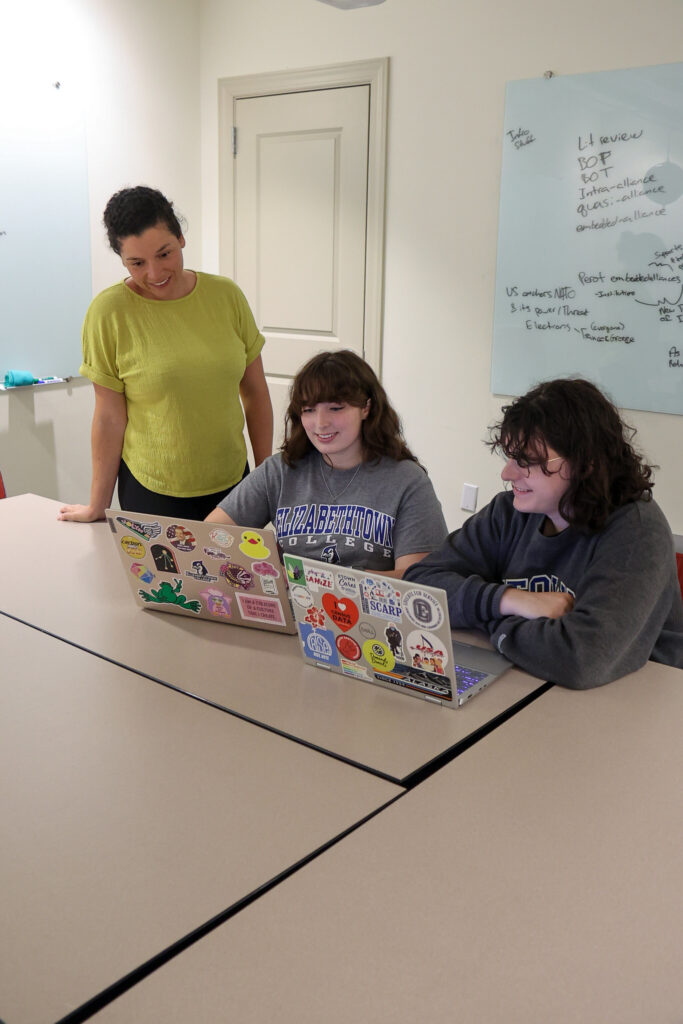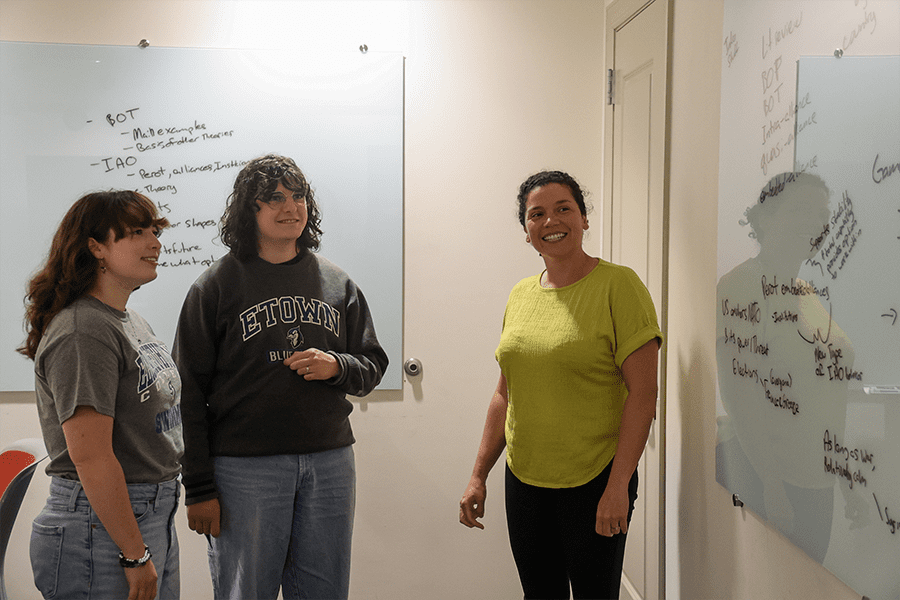Jordyn Dutko ’26 and Gabriel Karl ’25 are diving into literature reviews, government documents, and news coverage this summer to gain a new perspective and increase their understanding of international relations and the unprecedented intra-alliance conflict of the North Atlantic Treaty Organization (NATO) countries in the Eastern Mediterranean.
The two have compiled over 50 pages of text as part of the Summer Creative Arts and Research Program (SCARP) that will aid in the research of Professor of Political Science and College Professor of International Studies (Endowed Chair), Oya Dursun-Ozkanca’s upcoming third book, which will serve as a follow-up to her 2019 published work, “Turkey–West Relations: The Politics of Intra-alliance Opposition.”
Title of Research
Eastern Mediterranean Balance of Power: Projections on the Future of Transatlantic Alliance
Student Researchers
Jordyn Dutko ’26 (History and Political Science major) and Gabriel Karl ’25 (Political Science and Economics major)
Faculty Mentor
Oya Dursun-Özkanca, Professor of Political Science and College Professor of International Studies (Endowed Chair)
What are you researching?
Dutko: Since the summer of 2020, there have been alarmingly frequent iterations of the diplomatic term casus belli (cause for war) on both sides of the Aegean (in Turkey and Greece), representing a serious Security Dilemma, indicating a significant potential for intra-alliance conflict. Our research examines how the different foreign and domestic policy interests and national priorities of four NATO allies in the Eastern Mediterranean (the US, France, Greece, and Turkey) impact the future of the NATO Alliance. The Cyprus conflict disputed maritime boundaries in the Eastern Mediterranean, and the future of Libya and Syria serve as case studies and are examined through a comparative foreign policy lens using neo-classical realist theory. Our findings indicate more soft balancing and “boundary-breaking” behavior (Dursun-Ozkanca 2019), as well as limited hard balancing.
Why did you choose this topic?
Dutko: I have developed a strong interest in foreign policy analysis from my experience in International Relations and European Union Simulation classes. I did not know much about this particular topic previously and saw it as a fantastic opportunity to branch out from the type of research I typically work on.
Karl: When the project was proposed to me, I was excited to branch out from my typical quantitative research. The Eastern Mediterranean is going to be crucial in the coming years, so working on this research with scholars like Dr. Ozkanca and Jordyn Dutko is such a privilege.
What was the most interesting aspect of this research?
Dutko: The recent developments in the Eastern Mediterranean arguably make it the most volatile region in the world, even more so than the Balkans or the Middle East. My research focuses on Turkey and the United States’ positions–their interests, threats, and how they balance with other countries and institutions–and it has been so fascinating to learn about these factors and how they are driving the tensions in the region.
Karl: It is hard to choose just one aspect because there is so much happening and many moving parts. My role is to study France and Greece, and I think what has stuck out the most about France is how intent they are on restoring their influence independent of the United States. France has been influential in promoting European-based military initiatives, and they have certainly found success.
What are you hoping to accomplish through this research?
Dutko: We are aiming to fill a significant gap in the International Relations (IR) literature, as it lacks analysis on the Eastern Mediterranean conflict from a theoretical standpoint. This research will serve as the basis for Dr. Ozkanca’s new book on the topic. Needless to say, it has been an amazing learning experience and a way for me to apply my studies practically, knowing that I am making contributions to the field.
Karl: I am hoping to develop my understanding of the conflict and skills in comparative foreign policy analysis. By the end, I would like to be able to provide useful projections for the future of NATO and the region.
Talk about working with your mentor. How have they helped you throughout this experience?
Dutko: Dr. Ozkanca is an exceptional mentor, and it has been an honor to work with her on this project. As a prominent scholar on the subject, her expertise has been invaluable, and I have been able to learn so much from her. She always pushes me to be my very best, is incredibly supportive of my academic career, and has overall been an influential role model during my time at Etown.
Karl: My experience working with Dr. Ozkanca has been fantastic. On the first day of our project, she gave us an in-depth briefing on the region that made me feel like I had been following along from day one. Working with and learning from an expert on a topic is an amazing experience.
Hear from the faculty mentor — Oya Dursun-Özkanca
“I find one-on-one mentoring in the SCARP program to be extremely rewarding. The SCARP project helps facilitate honing my students’ research skills and introduces my students to the academic literature on European Studies and International Relations. This enables them to gain a well-rounded comprehension of the intricate aspects surrounding alliance politics and acquire a deeper understanding of the NATO Ally’s foreign policy interests in the region.”

